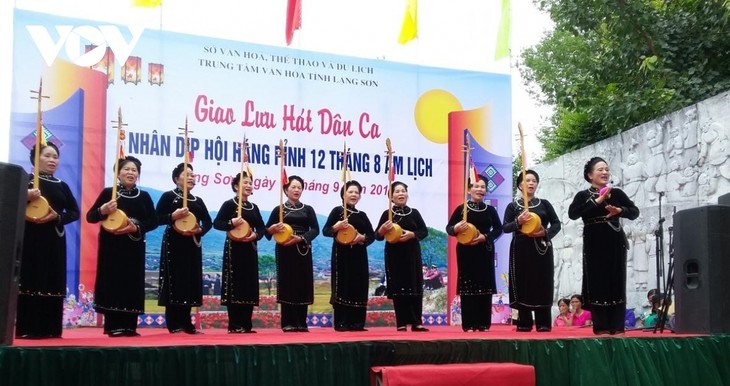(VOVWORLD) - The Tay and Nung people in Lang Son province celebrate the Hang Pinh Fullmoon Festival from the 12th to the 15th day of the 8th lunar month. People from near and far go to the festival to buy baked cakes as gifts for their parents and as Fullmoon offerings and to join singing sessions to find partners.
The Hang Pinh festival used to take place at Ky Lua market. Now the festive space has expanded to the area of the Hoang Van Thu statue in Lang Son city. The festival is crowded with thousands of Tay and Nung people wearing indigo clothing. When it gets dark, Sli singing begins.
 A folk singing festival for local ethnic groups is held in Lang Son province to mark the 2019 Hang Pinh Festival. (Photo: VOV) A folk singing festival for local ethnic groups is held in Lang Son province to mark the 2019 Hang Pinh Festival. (Photo: VOV) |
“We go to the Hang Pinh Festival every year. It’s always crowded and lively. Thousands of people gather at Ky Lua market and the Hoang Van Thu statue to eat baked cakes and sing Sli and Luon songs from morning to midnight. We wear festival clothing, meet old friends, sing folk songs, and teach young people our traditional culture,” said Ngo Thi Liem, a Tay woman.
Sli and Luon singing involve a call and response between men and women, who sing to get acquainted, to greet old friends, or to exchange experience in production and business. Many couples get married after a Hang Pinh singing session.
“Many people meet each other at a Hang Pinh singing session and become husband and wife. Some just become lifelong friends and often meet again at the festival. They help each other whenever needed, for example, to harvest their crops. It’s the cohesive character of the Tay and Nung,” said Ha Mai Ven, a famous Sli singer of the Nung Chao group in Lang Son province.
The Sli singing of the Nung was listed as a National Intangible Cultural Heritage in 2019. Songwriter and folklorist Hoang Huy Am said the recognition affirmed the uniqueness of Tay and Nung folk singing and the need to preserve and promote their intangible cultural heritages.
“Preservation work is very important. We should build a database of Sli songs for succeeding generations, teach them at ethnic boarding schools, and organize seminars and events to record performances,” Am said.